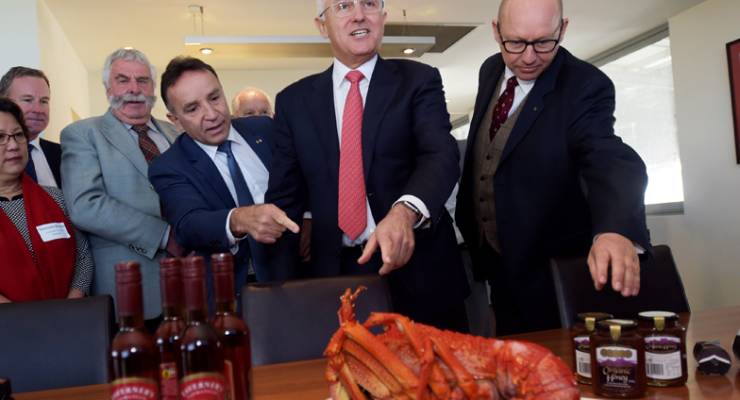
As they count the cost of the southward-moving storm front that has already brought some of the state’s worst flooding on record, voters in northern Tasmania can at least console themselves that disaster chose to strike their electorally sensitive turf in the midst of a federal election campaign.
Even without help from the forces of nature, the region is never far from the thoughts of political strategists, having been proverbial during recent decades for the brevity of its federal parliamentarians’ careers.
Three electorates account for the top half of the state’s pronounced north-south divide: Bass, encompassing Launceston and the north-east coast, which has changed hands at six of the last eight elections; Braddon, encompassing the north-west and its principal population centres of Devonport and Burnie, which has done so at four of the last six elections; and Lyons, accounting for the rural hinterland and the length of the east coast, which for a long time bucked the local pattern by staying faithful to Labor member Dick Adams.
However, all bets were off at the 2013 election, when hostility to both federal and state Labor governments catalysed into unprecedented double-digit swings.
This resulted in the eviction of three Labor MPs by the Liberals’ current self-styled retinue of “three amigos”: Andrew Nikolic in Bass, Brett Whiteley in Braddon and Eric Hutchinson in Bass.
The explanation for the region’s extraordinary volatility no doubt lies in its protracted economic stagnation and the resulting sense that neither party is deserving of its long-term loyalty.
The three electorates rank very near the bottom of the national ladder for average income, with Bass performing slightly the better out of the three due to the relative affluence of southern Launceston.
The other outstanding characteristic is a lack of ethnic diversity, with Braddon and Lyons leading the country for people speaking only English at home.
A particularly common sentiment among the prevailing demographic of white blue-collar workers is that a Labor Party that was created substantially to represent their interests has fallen under the sway of urban elites and big city migrant communities.
This first became evident with the momentous defeat Labor suffered at the Bass byelection in June 1975, which helped embolden the Coalition to block supply the following October.
One of the key issues on that occasion was the Whitlam government’s outstanding act of economic liberalism in cutting tariffs by 25%, which was widely blamed for a downturn in local manufacturing.
Similarly, Labor’s economic rationalism during the Hawke-Keating period was one of the reasons all three seats stayed in the blue column from 1983 to 1993.
Labor’s other big difficulty has been reconciling its pursuit of the environmental vote with the economic interests of a region whose principal industries include timber and mining.
Such factors proved fatally damaging in 1983, when Labor’s determination to block the Franklin Dam project caused Tasmania to buck the national trend that swept Bob Hawke to power; in 2004, when John Howard snookered Mark Latham on forestry policy in the last week of the campaign; and in 2013, when voters deserted Labor over the carbon tax and the party’s perceived closeness to the Greens at both federal and state level.
Conversely, Labor sympathies were activated at the two elections fought over Liberal plans for a goods and services tax in 1993 and 1998, and in response to the Howard government’s WorkChoices industrial relations laws in 2007.
Labor might have hoped that the lethal response to the first Tony Abbott-Joe Hockey budget would have had a similar impact, but it appears the loss of faith voters expressed at the 2013 election has left a lasting mark.
Just six weeks before the May 2014 budget, voters ejected Tasmania’s 16-year-old state Labor government with a force that would have rivalled the defeats in New South Wales in 2011 and Queensland in 2012, if only a kinder electoral system hadn’t softened the blow.
Liberal Premier Will Hodgman has maintained most of his popularity since that time, and this appeared to flow through to relatively respectable poll ratings for the federal Liberals through the Tony Abbott period and beyond.
When ReachTEL conducted a large-sample statewide poll for The Mercury three weeks ago, it found no evidence of any swing to Labor, in keeping with a broader impression that Labor’s gains at the national level aren’t landing where they are needed most.
Even so, margins in all three seats are very tight, and the leads attributed to the Liberals by ReachTEL are inside the margin of error.
Certainly the government has been taking nothing for granted, as it made a little too clear last month when grants from an investment fund were reallocated from Hobart to the state’s north.
Both sides might well view the post-disaster recovery effort as an opportunity to emphasise their concern through further locally targeted largesse.
Failing that, locals can at least expect to find Malcolm Turnbull and Bill Shorten on their doorstep shortly with a mop and bucket.








Crikey is committed to hosting lively discussions. Help us keep the conversation useful, interesting and welcoming. We aim to publish comments quickly in the interest of promoting robust conversation, but we’re a small team and we deploy filters to protect against legal risk. Occasionally your comment may be held up while we review, but we’re working as fast as we can to keep the conversation rolling.
The Crikey comment section is members-only content. Please subscribe to leave a comment.
The Crikey comment section is members-only content. Please login to leave a comment.